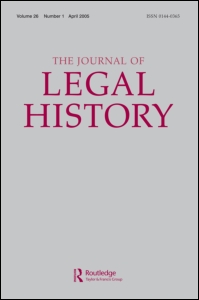(image source: University of Glasgow)
The Emergence and Development of Statutory Process for the Compulsory Purchase of Land for Transport Infrastructure in England and Wales, c.1530–1800 (Stephen Gadd)
Abstract:
Before 1539, highway improvement in England and Wales (other than the clearance of illegal obstructions) was achieved only by crown licence following a satisfactory inquisition ad quod damnum. Magna Carta chapter 39 recorded that ‘that no free man is to be … disseised … except by … the law of the land’, but in the wake of other wide-ranging reforms in the 1530s, amid a growing sense of the common weal and desire for ‘improvement’, parliament overcame this obstacle to economic infrastructural development by adjustment of ‘the law of the land’, assuming prerogative power and delegating by statute the authority for the compulsory purchase of land. In this case it was for river navigation at Exeter, and not until 1662 was the power extended to roads. Compensation was always to be paid, but legislation rarely stipulated the explicit outright purchase of freehold. Parliament was willing to grant these powers to trustees or other public bodies, or indeed to private individuals, but only if it was considered that doing so served the public interest.Rebutting the Presumption: Rethinking the Common Law Principle of Marital Coercion in Eighteenth- and Nineteenth-Century England (Emily Ireland)
Abstract:
While many historians refer to the legal presumption of marital coercion when discussing patterns of lenient judicial treatment of women in eighteenth-and nineteenth-century English criminal trials, few have analyzed the presumption in enough detail to ascertain the impact it genuinely had. This article undertakes close legal analysis of marital coercion. It argues that the presumption was not frequently referred to in nineteenth-century Old Bailey criminal trials for receiving stolen goods because of increasing judicial strictness as to the application of the presumption. A defendant had to prove her marriage, her husband’s presence at the crime scene, and, by the nineteenth century, evidence of her husband’s actual control. The presumption may have shifted from an irrebuttable presumption to one rebuttable upon proof that any of these requirements were absent. Therefore, women’s lenient court treatment during the modern period cannot be straightforwardly attributed to frequent successful recourse to marital coercion.‘It is necessary that the issue be heard to cry or squall within the four [walls]’: Qualifying for Tenancy by the Curtesy of England in the Reign of Edward I (Gwen Seaborne)
Abstract:
This article considers the test used to determine the presence or absence of life in newborn babies, in relation to a widower’s entitlement to remain in land brought to the marriage by his wife, as tenant by the curtesy of England. To qualify for curtesy, a widower needed to have produced a live and legitimate child, but, since even a short period of life was sufficient, there might be disputes as to whether a child which was now dead had ever been alive. The common law therefore had to develop a way of settling this difficult matter of confirming or denying the presence of life. Several thirteenth-century sources show an emphasis on a sound as an indicator of life. This article considers the use of a sound criterion in this area, arguing that thinking and practice surrounding the appropriate test were more complex, less settled, and more interesting than has been represented in somewhat perfunctory accounts in the work of later lawyers and legal historians. This is significant for the understanding of this area of medieval law, but also has broader implications within legal history and historiography, and for scholars from other fields such as medieval social and medical history.Scottish Legal History Group Report 2018
Migrations of Manuscripts 2018 (sir John Baker)
Book Reviews:
Commentaries on the Laws of England (Ian Williams)Read all papers on Taylor&Francis online.
A History of Tort Law: 1900-1950 (Mark Wilde)
Ecclesiastical Law, Clergy and Laity: A History of Legal Discipline and the Anglican Church (Charlotte Smith)


No comments:
Post a Comment